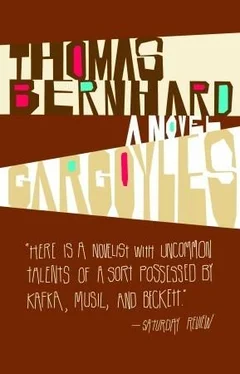We parked the car beside the waterfall and began climbing the dangerous footpath as quickly as possible. We had to watch every step; it was not advisable to look around. In silence we soon reached the outer walls of the castle. The climb had not strained my father at all. That surprised me. Before us we saw the one-story house in which the Krainer children live. Young Krainer, the son of upstanding parents who have served the Sauraus all their lives, is crippled. His sister led us straight into his room. He had heard us coming for some time, his sister said, and was restless. Their parents had gone into the castle early in the day. Young Krainer was just exactly my age, twenty-one, but looked twice as old. He had a black nightcap on his head and extended his hand to my father like a madman. Not to me. I sat down on a chair just inside the door. From there I watched what was going on in the room. Krainer’s sister said there was a draft from the window. She closed it. He had come today for a “general examination,” my father said.
I had the impression that up here an even more absolute silence reigned than down there in the gorge. It was no longer so dark as in the gorge, but everything here was also under the influence of darkness. The Krainer house, I had seen as we arrived, lay permanently in the shadow of the castle. The air on this height is keen; when you look down you are plainly looking into a pocket of sultriness.
My father and his sister undressed the cripple. It seemed to me that my father must be the only person whom the young Krainers see, aside from their parents, who work in the castle all day and are at home only at night.
As we emerged from the gorge and reached the peak, my father had proposed that while he was at the Krainers’ I walk on the lower wall of the castle. But I wanted to see the cripple and his sister. I had the impression that my father wished to keep me away from them. And so I went along just because he was averse to taking me with him. (Later, when we were descending into the gorge again, he told me that both Krainer children reminded him too much of his own; they were the same age as we, as myself and my sister, although “there was no real parallel.”)
Young Krainer had much too narrow a cranium. His eyes seemed to be starting out of his head. When his sister drew the blanket away from his body, I saw that he had one long and one short leg. For a while I could not decide whether his right leg was the longer one or his left. Finally I saw that the short leg was the left. If he stood up and started to walk, I thought, his motion would be like a huge insect.
They had difficulty persuading him to calm down. If anyone touched him, my father said, a quivering would seize his whole body, and at such times he was dangerous. He could hit out, bite, spit. He constantly made movements that complicated their efforts to prepare him for the examinations. Several times he struck out at his sister’s face. But my father finally succeeded in holding his arms down against the sides of the bed and at the same time in listening with the stethoscope. A smell characteristic of those who lie in bed for years filled the room. Krainer’s body was damp. He would slowly lose his speech entirely, my father later told me, as the result of progressive deterioration in his whole body. Even now you could understand only a fraction of what he said. He produced his words as if he were spitting them out. Most of it sounded as if spoken in an Oriental language. The rhythm in which he articulated was related to his physical malformation. What he spoke was just as crippled as the boy himself. Now and then he suddenly flung his long arms into the air, then let them drop again and laughed. His stomach was like an asthmatic sphere that his arms anxiously cradled for long moments. His head was relatively small; you saw that most plainly when he held it toward his protuberant belly in order to hear better the noises inside his stomach. He kept twitching his face almost continually in furious distortions. When he sat up, he seemed to be bobbing constantly. Maybe he imagines he is riding, I thought.
The bed linen was clean, probably because they expected my father, I thought. At times his bed had to be turned into a regular cage; a grating was placed over it for that purpose. But now, according to his sister, he was having a quieter period and did not need the grating. My father had always advised the Krainers never to remove the grating from his bed, but they did not follow his advice. He thought that the sick man might suddenly leave his bed and possibly kill them. But his sister had been unable to bear the sight of the grating after a while. It was now in the attic. She could not endure keeping her brother in a cage. If only they never had to bring that grating down from the attic again, she said. Her brother could no longer get up by himself, she thought, and if he did fall out of bed now and then it wasn’t as bad as having to see her brother continually in a cage.
My father took hold of the patient’s head and the sister held his arms down. Suddenly he wrenched his arms and head loose and tried to jump up. But he did not succeed. Abruptly, he laughed. Evidently it amused him to have my father examining his head, listening. My father tapped his forehead, drew down his eyelids, then pulled them up. He also checked young Krainer’s knee reflex. He would take a urine sample with him, he said. When he pulled off the nightcap, I was horrified because there was not a hair on young Krainer’s head. I noticed yellow spots on his temples, the same yellow spots, only smaller, that were on his chest. These yellow spots were scattered over his whole body. He had a tormenting fungus infection between his toes, his sister said, and for that reason he kept making rowing movements with his legs all night long. He no longer slept, she said. She herself sometimes closed her eyes from sheer exhaustion, but it was nothing like sleep. His trembling and dribbling had been going on for a year now. He relieved himself in bed. “Often he hears an army marching through the gorge,” she said.
Everywhere in the room, wherever there was space, were musical instruments on which young Krainer had been able to play when he was still healthy. There was a cello, and I saw an oboe lying on the chest of drawers. For years a music teacher from Knittelfeld had come up here to them and given him lessons. Her brother had learned the most difficult violin compositions by heart, she said. His favorite instrument was the cello, and Béla Bartok his favorite composer. There were hundreds of scores piled in the drawers of the chest, and he had learned them all by heart. He had done compositions of his own, including a Magnificat . As a child of eight he had already been able to play Mozart’s symphonies on the piano by heart. Only six months ago she had brought the cello to his bed twice, once in the morning and once in the afternoon, and he had played it until he was exhausted.
There was an open sore on his back, I saw, and on his chest he had red as well as yellow spots.
The music teacher from Knittelfeld had come up from the valley for years “gratis,” the Krainer girl said. “Often they played together half the night.” But once her brother had for no apparent reason hit the music teacher on the head with his violin bow, and from then on they no longer saw the music teacher. Her brother’s illness had immediately begun rapidly worsening.
On the drive home my father told me that young Krainer had been in the Steinhof asylum for four years. Throughout that time his sister had rented a tiny room in Ottakring in order to be near him. At first it had looked as if he would never get out of the mental hospital; the doctors always used the word “hopeless” when they spoke of him. But suddenly, after four years at Steinhof, after he had spent four years in the largest and most terrible of all European insane asylums, the doctors had suddenly told the girl she could take her brother home.
Читать дальше












